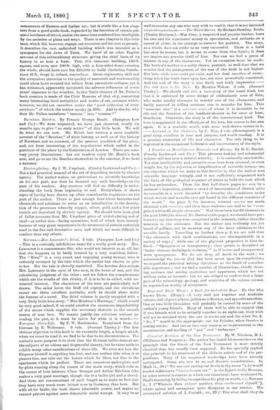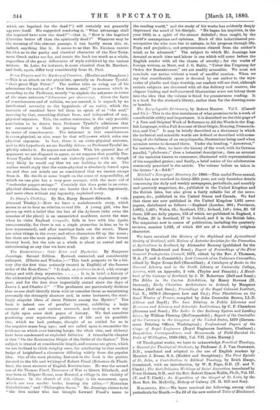Classical Revision, of the New Testament. By W. Nicolson, M.A.
(Williams and Norgate.)—The author has based his researches on the principle that the Greek of the New Testament is more strictly classical than has usually been supposed. He has specially applied this principle to his treatment of the definite article and of the pre- positions. Many of his suggested renderings bare been already anticipated. Some arc new to us, and deserve consideration. In Mark ix., 38 (" We saw one casting out devils in thy name "), he would render eicf3AAorra "trying to cast out." in the Epistle to the Romans, ho notes several instances in which our translators have weakened St. Paul's reasoning, by failing to reproduce his play on words, e.g., Romans ii., 1 ("Wherein thou judgest another, thou condemnest thyself"), where Kpfvfiv and KaTcucpivew quite disappear in our version. His attempted solution of I. Corinth., xv., 29 (" Else what shall they do which are baptised for the dead ?") will certainly not generally approve itself. His suggested rendering is, " What advantage shall the baptised have over the dead ?"—that is, "How is the baptised Christian better off than the spiritually dead ?" Whatever may be the meaning of this obscure passage, it can hardly mean this, or, indeed, anything like it. It seems to us that Mr. Nicolson carries his idea as to the purity and classical character of the New Testa- ment Greek rather too far, and treats the book too much as a whole, regardless of the great differences of style exhibited by the various writers. St. Luke, for instance, is more classical than St. Matthew, and both, again, differ very considerably from St. Paul.



































 Previous page
Previous page